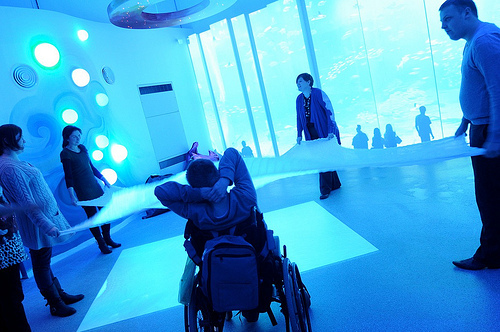Wisconsin’s State Assembly passed Assembly Bill 110, which would allow disabled students to take up to $13,376 in state funding to a public out-of district, private, or charter school. But because Assembly Democrats used a blocking procedure, the proposal must receive another vote before going to the state Senate.
Though Wisconsin’s open enrollment policy allows some children to move outside their designated school district, 44 percent of children with special needs were denied their requests to do so in the 2010-2011 school year.
“We haven’t looked at special education in this state for more than two decades,” said state Sen. Leah Vukmir (R-Wauwatosa), who cosponsored the bill. “The testimony was so compelling from parents, I don’t know how you could look the other way and not support this.”
The bill would add another voucher program to the state’s recently expanded one for poor children in Milwaukee and Racine.
“It’s hugely significant because it’s a statewide program, whereas other programs have been tied to geographic areas,” said Michael Ford, director of research for the Wisconsin Policy Research Institute. “Other parents, when they hear about choice, will be clamoring for it, but I think you’ll see some opposition based on that parochial instinct of public school districts.”
Defining Eligibility
The state Department of Public Instruction (DPI) must review a child’s Individualized Education Plan to determine the scholarship amount he would receive.
“Currently all students with special needs have to have an IEP,” Vukmir said. “We saw this as the easiest way to identify [eligible students]. The IEP incorporates the concerns of parents, public school officials, and other experts.”
In the year preceding the application, a candidate must also have attended a public school, a private school already accepting vouchers, or a school in another state.
To participate, private schools must be privately accredited or approved by the DPI. Every participating school must notify DPI and specify how many scholarship students it has room for. When slots are maxed out, the school must select students randomly.
Scholarships are limited to 5 percent of special needs children in the state. Wisconsin public schools currently teach about 125,000 special education students.
Other States as Models
Wisconsin is one of several states to pass legislation creating voucher programs for special needs students in recent years. Between 8 and 14 percent of the children already participating in the state’s voucher program for poor children in Milwaukee and Racine have special needs, Ford said.
“We’ll see that [achievement] gap close if kids using vouchers have more choices,” he said
Though initially similar to Florida’s McKay Scholarship Program, AB110’s public hearing in May shifted the language closer to Ohio’s John Peterson Scholarship Program.
Ohio’s special-needs scholarship program awards different levels of funding to students depending on the extent of their disability. The Wisconsin bill would instead give a student up to the statewide average spending per special-needs student or the cost of attending their new school, whichever is less, said Brian Pleva, Wisconsin government affairs associate for the American Federation for Children.
Tailoring Bill Language
Florida used preexisting line-item allocations for specific education services to set each child’s scholarship figure, which made the calculation simpler and less subject to dispute, said Allison Hertog, a lawyer specializing in special education and a board member of a Florida nonprofit that grants scholarships to disabled children. The Wisconsin bill also requires some public school districts to provide transportation for voucher students.
“I could see that being controversial,” Hertog said.
Wisconsin’s bill will require an annual financial report from participating schools, which the Florida program does not require.
“We should have it, but we don’t,” Hertog said. “It’s very controversial because private schools do not want to submit a financial report. Not submitting one has, in some cases, led to scandal.”
Taxpayer Savings
Since the average cost of educating a special needs student is above the bill’s cap of $13,376, public schools will save money when a special needs student transfers out, Vukmir said.
“In many cases private schools can educate special needs students better and at a lower cost,” she said.
The cap was added in a bill amendment to protect public schools from losing too much money too quickly, Ford said.
“It’s extraordinarily expensive to educate these kids,” Hertog noted. She said the bill would allow Wisconsin special needs kids a maximum scholarship amount while getting a good education.
Additional expenses for DPI personnel monitoring of participating schools have yet to be determined.
More Legislation Likely
If the bill passes, the resulting scholarship program will probably be amended to work better and expanded in years to come, Hertog said.
“If you look at the history of the McKay scholarship in Florida, it’s been amended, in small ways, pretty regularly in the past 10 years,” she said.
Such legislation recognizes parents’ intimate knowledge of their children’s needs, Pleva said.
“Whenever there’s a parent in Wisconsin who has a child with special needs and who is not happy with their current public school, they should have a right to take the money intended for their child and use it at the school of their choice,” he said. “They know better than anyone else what type of learning environment would be best for their children. This bill recognizes that.”
Image by Jon Rawlinson.




